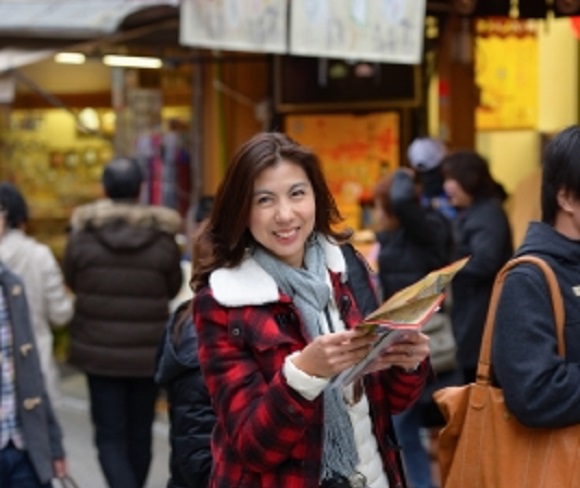
Travelling in a foreign country can be daunting, especially if you don’t know the language. While a one-year preparatory course isn’t necessary for just a week or so in a foreign land, learning a few key words and phrases is certainly recommended.
Some time ago, travel culture website Matador Network put together a list of “10 Extraordinarily Useful Japanese Phrases for Travelers“, a mostly tongue-in-cheek collection of phrases which, while at times giving some useful material, is probably more suited for those looking to jazz up their Japanese than it is for the average traveler. For that reason, perhaps, the list recently caught the eye of Japanese net users and has been garnering a lot of attention in the language’s homeland.
Check out the list below and see what you can use!
The original writer behind the list sensibly offers a word of caution before his article, stating: “SOME OF THESE JAPANESE PHRASES are practical. Some of them are funny. All 10 will greatly enhance your trip to Japan.” Since we like to think of ourselves as being fairly handy with the Japanese language (though we’re no Secret Ninjas…), we took a look at each one and made our own judgments.
1. Yoroshiku onegaishimasu. [よろしく おねがいします。]
Often translated as “Please treat me well”, this simple phrase is probably the one you will hear and use the most. Said when introducing yourself to someone for the first time, it is also used when making requests or asking favors of someone. For travellers it’s probably not going to be all that handy, but if you’re here for work or doing a homestay you’d do well to break this one out during your first meeting with your hosts.
2. Yosh, ganbarimasu! [よしっ、がんばります!]
Meaning “Alright, I’ll do my best!”, this phrase is used before starting something challenging, like heading off to an interview, a sports match, a test… Not a really useful travel phrase, though it might elicit a few laughs if you use it before you dig into a plate of something questionable, like a stinky, slimy pile of natto.
Image: FreeDigitalPhotos/ photostock
3. Ara? Onara suru tsumori datta kedo, unchi ga dechatta. [あら?おなら する つもり だった けど、 うんちが でちゃった。]
Hats off to Matador Network for including this ‘phrase’, which literally means “Oops. I meant to fart, but some poop came out.” The original writer of this list claims that when travelling Southeast Asia he “especially enjoy[s] muttering in Japanese about crapping [his] pants while walking past Japanese tourists” to see their reactions. Unless you’re looking to be the object of concerned and disgusted glances, you may want to save this for your friends who might appreciate the potty humor. Or just not use it at all. Still, you never know…
4. Mou dame. Yopparacchatta. Gomen. [もう だめ。よっぱらっちゃった。ごめん。]
“No more. I’m drunk. Sorry.” Going out drinking with a group of Japanese people can be a risky adventure. Depending on the crowd, you may find yourself receiving a refill despite the fact that you’re not even halfway through your drink. If you don’t want to wake up face-down on ground outside the station the next morning, this phrase can come in handy for warding off an unending onslaught of alcohol.
5. Koko wa doko? Watashi wa dare? Nani mo wakannai. [ここは どこ? わたしは だれ? なにも わかんない]
“Where am I? Who am I? I don’t know anything.” In case you fail to use the previous phrase and do end up face down on a bench in an unknown neighborhood, this will certainly get across your confusion, though it probably won’t get you any help from passersby. The phrases can of course be used individually, should you not, in fact have completely lost your memory.
Image: FreeDigitalPhotos/ Phaitoon
6. Issho ni karaoke ni ikou ka? [いっしょに からおけに いこうか?]
Meaning “Shall we go to karaoke together?” the original writer of this list describes the phrase as “a good line to use if trying to pick someone up from the bar. Think of karaoke as a transition point between the bar and the love hotel.” But here’s a pro-tip from yours truly: have some more class, guys!
7. Hontou ni oishii desu yo! [ほんとうに おいしい ですよ!]
Here’s one that is actually worth remembering, and will put you in a good place with your host for your good manners. Meaning “It’s really delicious!”, this one can be shortened to simply “Oishii desu!” However, the “hontou ni” adds more emphasis, and can be used when you try something you particularly enjoy. Alternatively, you could add “sugoku” or “totemo” instead.
8. Anata wa haru no ichiban no sakura yori utsukushii desu. [あなたは はるの いちばんの さくら より うつくしい です。]
“You are more beautiful than the first cherry blossom of spring.” I wouldn’t recommend using this pick-up line in earnestness, as your attempt at being poetic might get you laughed at instead. Think along the idea as the “Heaven called, they said they’re missing an angel” pick-up line. But, hey, the Japanese enjoy a good laugh as much as the rest of us, so this might even work!
Image: FreeDigitalPhotos/ taesmileland (edited by RocketNews24)
9. Nihon daisuki. [にほん だいすき]
“I love Japan.” Can’t really go wrong with this one, and it will definitely make your Japanese host or friends glad to hear you’re enjoying your stay.
10. Konna ni kirei na tokoro wa hajimete mita! [こんなに きれいな ところは はじめて みた!]
“I’ve never seen a place this beautiful before!” It might sound a bit cheesy, but if you actually mean it when you say it, and say it with sincerity, it will be well received. Since it does carry a rather strong feeling with it, you probably do only want to save it for a place that is actually breath-takingly beautiful. Otherwise, a simple “Kirei!” (“It’s beautiful!”) will suffice.
Obviously, the writer behind the list meant for it to be humorous, though most of the commenters seemed unimpressed and disappointed at its lack of actual useful phrases. For me, I think a simple please (kudasai; onegaishimasu) and thank you (arigatou gozaimasu) can get you far in any country, so if you have those down you’ll probably be able to get by in Japan, a country whose people are generally very patient and accommodating.
But what other essentials should visitors learn? Japan veterans, what words and phrases would you have put on the list if you were writing it? If you’ve never been to Japan before, what do you think would help you get around? Let us know in the comments section below!
Source: Matador Network via Yurukuyaru
Top image: FreeDigitalImages/ num_skyman




 Let’s learn Japanese through terrible “American jokes”
Let’s learn Japanese through terrible “American jokes” New Hatsune Miku Music Video “ODDS&ENDS” Leaves the World in Tears 【Updated】
New Hatsune Miku Music Video “ODDS&ENDS” Leaves the World in Tears 【Updated】 Unforgettable lines from popular manga
Unforgettable lines from popular manga Our Japanese reporter talks to a stranger on Skype…things get awkward
Our Japanese reporter talks to a stranger on Skype…things get awkward Commercial reminds Japan’s tired commuters about the drawbacks of living far away from work
Commercial reminds Japan’s tired commuters about the drawbacks of living far away from work Highest Starbucks in Japan set to open this spring in the Tokyo sky
Highest Starbucks in Japan set to open this spring in the Tokyo sky Skyscraper sized Pokémon cards to appear in Tokyo all year long in Tocho projection mapping event
Skyscraper sized Pokémon cards to appear in Tokyo all year long in Tocho projection mapping event Saitama is home to the best strawberries in Japan that you’ve probably never even heard of
Saitama is home to the best strawberries in Japan that you’ve probably never even heard of Survey finds that one in five high schoolers don’t know who music legend Masaharu Fukuyama is
Survey finds that one in five high schoolers don’t know who music legend Masaharu Fukuyama is Starbucks Japan complexly raises prices, will now charge for takeout bags
Starbucks Japan complexly raises prices, will now charge for takeout bags The 10 most annoying things foreign tourists do on Japanese trains, according to locals
The 10 most annoying things foreign tourists do on Japanese trains, according to locals Japanese tough guy fashion starter pack: Testing the Birth Japan lucky bag【Photos】
Japanese tough guy fashion starter pack: Testing the Birth Japan lucky bag【Photos】 Foreign tourists in Japan will get free Shinkansen tickets to promote regional tourism
Foreign tourists in Japan will get free Shinkansen tickets to promote regional tourism Yoshinoya’s new ramen doesn’t smell like it tastes【Taste test】
Yoshinoya’s new ramen doesn’t smell like it tastes【Taste test】 What is this weird train spotted at a Japanese railway station?
What is this weird train spotted at a Japanese railway station? Starbucks Japan releases new sakura goods and drinkware for cherry blossom season 2026
Starbucks Japan releases new sakura goods and drinkware for cherry blossom season 2026 Naruto and Converse team up for new line of shinobi sneakers[Photos]
Naruto and Converse team up for new line of shinobi sneakers[Photos] Is Sapporio’s Snow Festival awesome enough to be worth visiting even if you hate the snow? [Pics]
Is Sapporio’s Snow Festival awesome enough to be worth visiting even if you hate the snow? [Pics] Japan has trams that say “sorry” while they ride around town…but why?
Japan has trams that say “sorry” while they ride around town…but why? Tokyo Skytree turns pink for the cherry blossom season
Tokyo Skytree turns pink for the cherry blossom season Sakura Totoro is here to get spring started early with adorable pouches and plushies
Sakura Totoro is here to get spring started early with adorable pouches and plushies Poop is in full bloom at the Unko Museums for cherry blossom season
Poop is in full bloom at the Unko Museums for cherry blossom season Shibuya Station’s Hachiko Gate and Yamanote Line stairway locations change next month
Shibuya Station’s Hachiko Gate and Yamanote Line stairway locations change next month Japan’s new “Cunte” contact lenses aren’t pronounced like you’re probably thinking they are
Japan’s new “Cunte” contact lenses aren’t pronounced like you’re probably thinking they are Japan’s newest Shinkansen has no seats…or passengers [Video]
Japan’s newest Shinkansen has no seats…or passengers [Video] Foreigners accounting for over 80 percent of off-course skiers needing rescue in Japan’s Hokkaido
Foreigners accounting for over 80 percent of off-course skiers needing rescue in Japan’s Hokkaido Super-salty pizza sends six kids to the hospital in Japan, linguistics blamed
Super-salty pizza sends six kids to the hospital in Japan, linguistics blamed Starbucks Japan unveils new sakura Frappuccino for cherry blossom season 2026
Starbucks Japan unveils new sakura Frappuccino for cherry blossom season 2026 Take a trip to Japan’s Dododo Land, the most irritating place on Earth
Take a trip to Japan’s Dododo Land, the most irritating place on Earth Is China’s don’t-go-to-Japan warning affecting the lines at a popular Tokyo gyukatsu restaurant?
Is China’s don’t-go-to-Japan warning affecting the lines at a popular Tokyo gyukatsu restaurant? Survey asks foreign tourists what bothered them in Japan, more than half gave same answer
Survey asks foreign tourists what bothered them in Japan, more than half gave same answer Japan’s human washing machines will go on sale to general public, demos to be held in Tokyo
Japan’s human washing machines will go on sale to general public, demos to be held in Tokyo Starbucks Japan releases new drinkware and goods for Valentine’s Day
Starbucks Japan releases new drinkware and goods for Valentine’s Day We deeply regret going into this tunnel on our walk in the mountains of Japan
We deeply regret going into this tunnel on our walk in the mountains of Japan Studio Ghibli releases Kodama forest spirits from Princess Mononoke to light up your home
Studio Ghibli releases Kodama forest spirits from Princess Mononoke to light up your home Major Japanese hotel chain says reservations via overseas booking sites may not be valid
Major Japanese hotel chain says reservations via overseas booking sites may not be valid Put sesame oil in your coffee? Japanese maker says it’s the best way to start your day【Taste test】
Put sesame oil in your coffee? Japanese maker says it’s the best way to start your day【Taste test】 No more using real katana for tourism activities, Japan’s National Police Agency says
No more using real katana for tourism activities, Japan’s National Police Agency says The 30 most ‘romantic’ lines that women want to hear (well, according to the Japanese internet)
The 30 most ‘romantic’ lines that women want to hear (well, according to the Japanese internet) Inventor of instant ramen noodles appears as Japanese samurai in awesome new animated rap video
Inventor of instant ramen noodles appears as Japanese samurai in awesome new animated rap video Japanese women prove domestic-minded men are sexy with crazy-long Twitter hashtag
Japanese women prove domestic-minded men are sexy with crazy-long Twitter hashtag Tea cups and biting breasts: Japanese phrases that sound like weird English
Tea cups and biting breasts: Japanese phrases that sound like weird English Getting a haircut in Japan: A survival guide
Getting a haircut in Japan: A survival guide Studio Ghibli releases free-download board game — Here’s how to play it without reading Japanese
Studio Ghibli releases free-download board game — Here’s how to play it without reading Japanese Learn Japanese through ridiculous manga: Death Vote 【Episode #6】
Learn Japanese through ridiculous manga: Death Vote 【Episode #6】 Japanese ad promoting Miyazaki Prefecture shows how foreign its own dialects can be 【Video】
Japanese ad promoting Miyazaki Prefecture shows how foreign its own dialects can be 【Video】 Your vote will decide which Ghibli film will be shown on the big screen in Japan!
Your vote will decide which Ghibli film will be shown on the big screen in Japan! The top 70 words that keep showing up in Japanese light novel titles (and yes, isekai is one of them)
The top 70 words that keep showing up in Japanese light novel titles (and yes, isekai is one of them) When “yes” means “no” — The Japanese language quirk that trips English speakers up
When “yes” means “no” — The Japanese language quirk that trips English speakers up Spice up boring Japanese classroom vocab with the cooler words in this cute video【Video】
Spice up boring Japanese classroom vocab with the cooler words in this cute video【Video】 18 Japanese words understood around the world
18 Japanese words understood around the world Studio Ghibli releases New Year’s stamps for 2024
Studio Ghibli releases New Year’s stamps for 2024 Learn Japanese through ridiculous manga: Dragon Bowl【Episode #4】
Learn Japanese through ridiculous manga: Dragon Bowl【Episode #4】